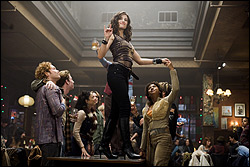The instant I left the screening room after Chicago, I would’ve bet 1,000 bucks it would win the Oscar. Rent could win, too, but I’m not sure how much money to bet. (It opens Wednesday, Nov. 23, at the Neptune and other theaters.) On the plus side, Rent was a much bigger stage hit than Chicago, and decades more recent. Other shows won quadruple Tony Awards, but none won the Pulitzer before it even got to Broadway. And you’d think that Rent‘s rocklike score would be an easier sell to mass audiences than Chicago‘s more retro sound.
Besides, you can’t beat the back story. N.Y.C. composer/author Jonathan Larson toiled for years waiting tables, nicked the gist of Puccini’s La Bohème plus some ideas from Sarah Schulman’s angry AIDS novel People in Trouble, set his fable in the Reagan Dark Ages, whipped up some lovely melodies and irreverent lyrics, and put them in the mouths of theater babes—unknowns who swiftly bowled over the critics in the original 1996 production. (Most of them appear now in the film version.)
But in the most dramatic real-life melodrama since Gower Champion’s demise just before the triumphant revival of 42nd Street, young Larson dropped dead hours before the first preview of Rent. It was a freakish aortic condition, not AIDS, but the poignance of his loss echoed that of Puccini’s Mimi.
TWO DECADES removed from that direr time it immortalizes, Rent becomes less a cri de coeur and more of an upbeat, Fame-like rave-up. The tunes are certainly timeless, from the thrilling, opening-scene faux- gospel “Seasons of Love,” performed on a bare stage à la A Chorus Line, to the barbaric yawp of “La Vie Bohème” and its Alphabet City credo shouted out in an East Village beer hall putsch: “Bisexuals, trisexuals, homo sapiens! Carcinogens, hallucinogens, men, Pee Wee Herman! German wine, turpentine, Gertrude Stein! Antonioni, Bertolucci, Kurosawa, Carmina Burana!” The scene is better than Puccini’s and the “Sodomy” song in Hair put together.
The theater people prove to be entirely ready for their big-screen close-ups. As the quasi-narrator Mark, a four-eyed documentary filmmaker among the bohemians, Anthony Rapp enraptures in just the right nerdy way. (After all, his character “can’t hold an erection on high holy days.”) Adam Pascal, a stage vet with matinee-idol looks, brings a shiny scruffiness to the role of Roger, the musician who longs to compose “One Song Glory” before HIV ends his quest.
Idina Menzel is by Hollywood standards a bit jarringly underattractive as Maureen, the drama-queen performance artist who dumps Mark for straitlaced Harvard lawyer Joanne (the gorgeous Tracie Thoms), but she pulls it off with sheer effrontery. As computer whiz Tom and Angel the drag queen and plastic-pickle-tub street drummer, who find true gay love in the face of AIDS, Jesse L. Martin (Law & Order) and Wilson Jermaine Heredia, respectively, bring tears to one’s eyes.
Non-original-cast newcomer Thoms outsings anybody in the cast, give or take a melisma. OK, Rosario Dawson is no match for Daphne Rubin-Vega’s original Mimi. When she sings “Out Tonight,” she acrobatically prances well, but her pipes can’t quite give it the full anthemic oomph Larson calls for. Even so, if you’d never heard the original cast recording, you might not mind a bit. Dawson has the star power and moxie moves to inspire even a Seattleite to get out of that goddamn comfy chair and into the night.
Taye Diggs makes the most of his scene as the turncoat bohemian who threatens eviction and gentrification upon his old pals. Unfortunately, the scene is all awkward exposition, and points up the weakness of the show: The story is sketchy, illogical, and unresolved even by opera standards. That’s why, when novelist Schulman complained about the alleged heist of her story, she got bupkis of the billion dollars’ profit (from productions and revivals worldwide), and her novel now sells for 30 cents on Amazon. Rent is not about the story and not really about its stock characters. It’s all about the passionate moment, “One Song Glory,” over and over until it’s all over.
I’m not sureRent will romp its way to Oscar glory the way Chicago did, but that’s what makes it more valuable and traditional. (Chicago was practically a movie to start with.) Larson was strictly a theater beast—the subversive spawn of his fond mentor Stephen Sondheim. Even director Chris Columbus—the most movie-ish of movie people—manages to make a terrific-looking film here without losing Larson’s stage essence. And he has the courage to let recitative be recitative, not the voice-over studio suits or test audiences might prefer.
Granted, the grand jeté from stage to screen is not unfaltering. Characters stride purposefully with no actual dramatic purpose other than to do something, anything, other than stand there and sing. (Even when Howard Cummings’ production design would let them.) When one character goes home to Santa Fe before realizing his folly and returning to the bosom of Manhattan bohemia, the scenes of him zipping around the desert in a sports car and schlepping along a dun-colored ridge add nothing to what he’s singing. When Columbus falters, it’s because he’s trying too hard to de-stagify a show that’s intrinsically, gloriously stagey.
Rent works best as a centaur creation: half-movie, half-play, plunging into theater world in all its mindless, cheesy, sentimental splendor. Movies don’t offer anything like the meet-cute of the guitar singer and junkie stripper in the “Light My Candle” number. It works analogously to Romeo and Juliet’s meeting, where falling in love is symbolized by the unifying magic of the sonnet their dialogue adds up to. The characters are barely there in Larson’s book, but his score brings them to life as a fused entity of romance eternal.








